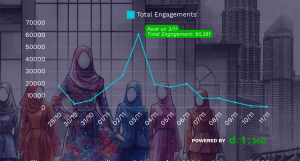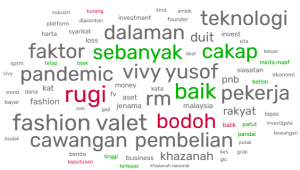With an investment of RM47 million from government-linked companies (GLCs) like Khazanah Nasional Bhd and Permodalan Nasional Bhd (PNB), FashionValet’s downfall has become a symbol of perceived mismanagement and lack of accountability in handling taxpayer money. From demands for investigation to calls for systemic change, the story has captured intense public attention, highlighted by netizens’ frustration and scepticism towards GLC investments.
From business controversies like the FashionValet scandal to insights on essential social media monitoring metrics, our coverage spans diverse industries and issues. Explore more stories in our News section.
Timeline Of Key Events
The scandal began as murmurs on social media but quickly grew into a national conversation:
October 29, 2024 – Initial Public Backlash
Criticisms surged across social media as netizens questioned FashionValet’s financial troubles and the RM47 million investment by Khazanah and PNB. Early demands for accountability highlighted concerns about GLC governance and raised alarms about the use of public funds in high-risk ventures.
November 1, 2024 – Founders Step Down
Amidst the growing backlash, co-founders Vivy Yusof and Fadzarudin Shah Anuar resigned, accepting responsibility for FashionValet’s financial downfall. However, this move did little to appease critics, as Vivy Yusof faced additional scrutiny over her affluent lifestyle and perceived wealth during the brand’s struggles.
November 2, 2024 – Prime Minister’s Directive
Prime Minister Anwar Ibrahim intervened, ordering an internal audit of Khazanah’s investment in FashionValet. He emphasised the need for improved governance and public oversight within GLCs, addressing netizens’ calls for greater transparency.
November 4, 2024 – Parliamentary Debate and Dr. Kelvin Yii’s Criticism
In Parliament, Dr. Kelvin Yii questioned the oversight of FashionValet’s investment, challenging the notion that high-risk investments are typical for venture capital when public funds are involved. His comments intensified calls for more rigorous scrutiny over GLC investments.
November 7, 2024 – MACC Investigation and Bank Account Freezes
The Malaysian Anti-Corruption Commission (MACC) advanced its investigation, identifying several suspicious transactions related to FashionValet’s funding. Chief Commissioner Tan Sri Azam Baki announced that the MACC had frozen the bank accounts of Vivy Yusof and Fadzarudin Shah Anuar to secure assets for further investigation.
Peak Engagement: A Surge In Public Attention

FashionValet’s scandal drew substantial public engagement, with the highest activity recorded on 3rd November, accumulating 60,381 interactions. This peak highlighted the growing frustration and mounting calls for transparency and reform. Across platforms like TikTok, YouTube, and Facebook, users voiced concerns, dissected the controversy, and demanded action. This unprecedented level of engagement underscores the public’s desire for clearer answers and stronger governance within GLC investments.
Channel Volume: Volume & Engagement Across Platforms
The FashionValet scandal sparked an unprecedented level of engagement across various social media channels, reflecting a high level of public interest and concern.
TikTok and YouTube saw significant traffic, with users posting videos, analyses, and discussions on the topic, often amplifying calls for accountability and governance reforms.
Facebook and Twitter became key platforms for netizens to voice their opinions, share news updates, and fuel discussions around the scandal.
The cross-platform engagement indicated that Malaysians were not only aware but actively discussing and dissecting the issue, turning it into a nationwide conversation.
Social Sentiment:

A comprehensive analysis of social media comments revealed 95% negative sentiment, with public frustration centered on alleged financial mismanagement, misuse of funds, and lavish lifestyles of FashionValet’s founders.
With 95% negative sentiment and only 5% neutral, netizens overwhelmingly expressed frustration over perceived financial mismanagement, misuse of public funds, and the founders’ lavish lifestyles. Criticism was directed heavily at Khazanah, PNB, and GLC leadership, with demands for transparency and accountability. The limited neutral comments focused on the business aspects, brand viability, or simply requesting more information without taking a stance. This overwhelmingly negative landscape underscores a deep mistrust and dissatisfaction, signalling strong calls for systemic reform and closer scrutiny of public fund management.
Key topics in the conversation included:
Calls for Transparency and Accountability (30%)
A dominant theme across comments was the call for greater transparency. Many netizens demanded an in-depth investigation to fully understand the factors that led to FashionValet’s collapse.
Allegations of Misuse of Funds (25%)
A substantial portion of netizens questioned the allocation of RM47 million, echoing suspicions of misappropriated public funds and calling for answers from GLCs.
Calls for MACC Investigation (20%)
In response to the scandal, netizens urged the MACC to hold all involved parties accountable, showcasing a deep-seated distrust in GLC governance.
Criticism of Founders’ Luxury Lifestyle (15%)
Many users criticised the founders’ perceived extravagant lifestyles, which starkly contrasted with FashionValet’s financial decline.
Concerns Over GLC Investment Practices (5%)
The scandal raised broader concerns about the GLCs’ investment criteria, as netizens questioned the oversight and risk management applied to public funds.
Practice of Nepotism (5%)
Speculations of nepotism within FashionValet and related entities surfaced, adding to the sentiment of distrust and resentment among netizens.
Word Cloud Analysis:

The word cloud surrounding the Fashion Valet scandal revealed public outrage over financial mismanagement and a lack of accountability. Key terms like “bodoh” (stupid) and “rugi” (loss) captured frustration over ongoing investment losses, while “terlepas” (missed) and “investigation” highlighted demands for scrutiny to ensure those responsible faced consequences. Words such as “bijak” (smart) and “kurang” (lacking) criticised inadequate oversight and decision-making. Terms like “pandemic reflected netizen disbelief, as many felt the company should have thrived in modest fashion during the pandemic, yet still incurred significant investment loss. Keywords like “jenama” (brand), “aset” (assets), and “harta” (property) indicated concerns over how company resources were managed, while “gaji” (salary) and “CEO” pointed to dissatisfaction with high executive pay amidst struggles. “Dalaman” (internal) and “SPRM” (Malaysian Anti-Corruption Commission) underscored demands for a thorough investigation. Meanwhile, “Khazanah,” “PNB,” and “GLC” linked with “grab” suggested netizens suspected misappropriation or opportunistic gains involving public funds, reinforcing calls for transparency, accountability, and reform. Altogether, these keywords reveal an urgent demand for greater accountability and transparency in public fund management.
A Moment for Systemic Change?
The FashionValet scandal serves as a critical wake-up call, emphasising the need for transparency and accountability within GLCs. With RM47 million at the heart of the controversy, netizens continue to demand answers and systemic reform. This scandal could catalyse a turning point in Malaysia’s approach to public investment, potentially encouraging GLCs to adopt stronger oversight, risk management, and ethical governance.
The broader question remains: Will this case inspire the change needed to restore public trust, or could this be a pivotal moment for investment firms which linked to the Malaysian government to reassess their investment strategies, particularly regarding the company linked to sovereign wealth fund







